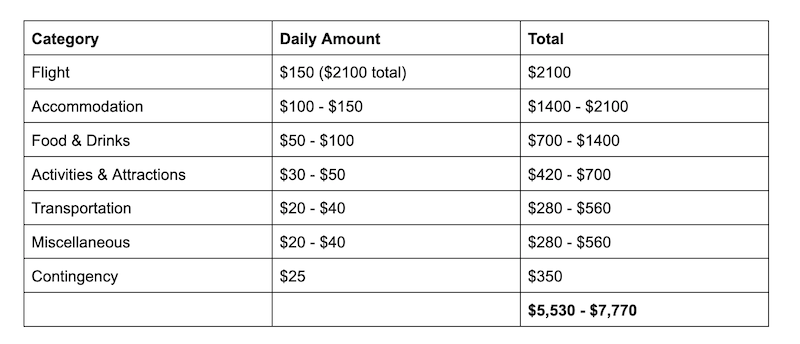
How to Make a Travel Budget: Travel for Cheap & Have the Time of Your Life
By: Nick Callos
Skip to Section
Article Summary
Ready to take a vacation without draining your savings? This step-by-step travel budgeting guide breaks everything down — from planning your total budget to using points and cutting costs without cutting corners.
This guide walks you through building a travel budget that works in real life — not just in theory. Whether you’re prepping for a short getaway or long-term adventure, this helps you get your finances sorted so you can actually enjoy your trip.
- Set your total trip budget first so you know what you’re working with.
- Break down costs into real categories — flights, food, lodging, and the little stuff.
- Track expenses during the trip to avoid overspending and fix issues on the go.
- Use miles, points, and off-peak strategies to bring down your costs fast.
- Build in a buffer for surprises, and review everything as you go.
It’s hard to travel for cheap. The average cost of a one-week vacation in the USA is $1,991, according to a Chime study. That’s a good chunk of cash.
The solution to ensuring you don’t break the bank while vacationing is to approach budgeting head on. Learning how to make a travel budget that’s realistic can allow you to have a great time and keep spending within reason.
In this article, we’ll cover everything about how to make a travel budget, as well as ways to travel the world for cheap. By being intentional and savvy with your budget, you won’t overspend in incredible fashion. You’ll manage your finances effectively while enjoying your trip.
Who needs to learn how to make a travel budget?
Anyone who plans to travel or is traveling should learn how to make a travel budget. Digital nomads can also benefit from making a travel budget to choose the best locations for their lifestyle.
If you’re planning a vacation, a travel budget can help you determine how much money you need and identify any savings shortfalls. It can also serve as a guide for setting savings goals. If you’re about to take off or are currently traveling, a travel budget can ensure you make wise spending decisions as you go.
Now, read our step-by-step guide on creating a travel budget and saving money on your vacation.
1. Determine your total budget
The first step is to determine how much money you can afford to spend on your trip. Use the following process:
- Figure out where and when you’ll be going
- Research average costs of your destination (e.g.e, how much is a 2-week or month trip there?)
- Add up your current savings for travel
- Calculate savings from income you can generate before you depart
- Consider other savings you have, such as credit card points for hotels (which can offset expenses)
2. Break down your expenses
Managing expenses wisely is one of the most important parts of learning how to make a travel budget. Identify the categories where you’ll be spending money.
- Transportation: Flights, trains, buses; car rentals, gas; local transportation (taxis, public transit)
- Accommodation: Hotels, hostels, vacation rentals
- Food: Meals, snacks and drinks, special dining experiences
- Activities: Attractions such as museums and parks; tours and excursions
- Miscellaneous: Shopping, travel insurance, souvenirs, unexpected expenses
3. Research costs
If you want to travel for cheap, you have to know estimated costs for each category based on your destination. You can get a good idea by researching average flight and hotel costs for your destination, as well as other expenses such as tours, dining, and shopping. Travel platforms such as TripAdvisor and Expedia can offer good insight here.
Additionally, local travel guides and budgeting sites can provide details into total estimated costs. If you plan to visit Costa Rica, for example, Budget Your Trip has estimates for daily, weekly, and monthly costs.
4. Create a spreadsheet or use a budgeting tool
As you read this guide on how to make a travel budget, an online budget tool, spreadsheet, or even good ol’ pen and paper will be helpful in keeping everything within view and calculated properly.
So, set up a spreadsheet or use a budgeting app. It’s a way to record spending in real time, ensuring you effectively track projected costs versus actual expenses. This will help you prevent going over budget.
5. See if you have enough savings
After researching the costs of your trip, allocate funds to each spending category. Be realistic, and make sure to leave room for flexibility. Some folks prefer having spending ranges, as it can be less stressful than trying to stay under a hard number.
This step should give you a decent idea of if you’re on track to have enough cash for your trip—and what you need to do to solve any savings shortfalls (which we discuss below).
6. Use cost-saving strategies to lower your travel budget
No guide on how to make a travel budget would be complete if we didn’t discuss how to travel for cheap and solve any savings shortfalls. There are several tried-and-true ways to save, including:
- Go during off-season: Yes, you may have a certain time you wish to travel. But off-season rates are significantly lower. For example, prices for African safaris are up to 40% cheaper during off-season; rail prices in North America drop by about 20%.
- Spend less on hotels: Do you feel comfortable staying at a 3-star hotel instead of a 4- or 5-star hotel? If so, you can save hundreds, if not more than thousand, on a multi-week trip.
- Spend less on flights: Look at budget airlines if you’re willing and be flexible with flight days. According to FareCompare, the cheapest days to fly are Tuesday, Wednesday, and Saturday.
- Use public transportation and a bike: Uber is convenient, but expenses add up quickly. If your destination has good public transit, use it! A bike rental can be a good option as well.
- Go for good cheap eats: You can surely discover tasty local food that’s both affordable and delicious. You may find a $10 meal from a food truck that beats the $50 dining experience.
Consider where you’re willing to spend less, and you’ll see that you can quickly reduce your overall budget. For more info, read our guide on how to travel the world for cheap.
7. Use points and miles to significantly reduce expenses
When thinking about how to travel for cheap, don’t forget about points and miles.
First, check if you have any airline, hotel, or credit card points available to fund your trip. You may find you have 20,000 Delta miles available to help pay for your flight!
Second, if you’re willing and have decent credit, take action to obtain more points. If you have a budget shortfall to close, or simply wish to save as much money as possible, travel credit cards often offer signup bonuses for meeting spending thresholds. The Chase Sapphire Preferred®, for instance, regularly provides bonuses ranging from 50,000 to 75,000 points for spending $3K in the first 3 months of having the card. That bonus ranges from $500 to $1,000+ in travel value.
Once you get the signup reward, you should have enough points to pay for part or all of the flight or hotel. This can significantly reduce your travel budget.
To find out about the latest travel credit card deals, check out:
- The Points Guy: One of the first sites to cover travel credit card hacks
- Nerd Wallet: News and updates on all credit card bonuses
- Upgraded Points: Lists out all the latest points and miles deals
8. Readjust your budget and consider a contingency fund
Once you’ve figured out how you can cut travel expenses with budget strategies and points and miles, recalculate your budget. You may be surprised that you can actually travel for cheap.
Just remember it’s better to be safe than sorry. Set aside a small percentage of your total budget as a contingency fund. For example, if your budget is $2,500—$3,000 for a trip to Mexico, you can add 20% to your budget as a contingency fund ($500—$600). This will take care of unexpected expenses, as well as offset any budgeting errors.
9. Track your spending, review and adjust
Now, it’s time to start booking transportation, accommodation, and more. Record your expenses as you go so everything remains accurate and updated. This will help you stay within your budget.
Furthermore, your tracker will allow you to do real-time spending reviews. If you’re overspending in one area, see if you can cut back in another. Staying flexible can help you enjoy your trip without financial stress.
10. Execute your travel plan
Learning how to make a travel budget is only the first step. The key is to stick to it.
If you’re intentional about staying within your budget, you’ll have a great time and you won’t spend too much. And by managing this trip successfully, you’ll be in a good position for more trips in the future!
How to make a travel budget: Example of spending categories
Here’s an example of a travel budget:
- Destination: Japan
- Duration: 2 weeks
- Type of Traveler: 2 mid-range travelers from New York

Now, if our two New York travelers use points to pay for the flight, their budget range reduces significantly—down to $3,430—$5,670.
You know how to make a travel budget. Go travel for cheap!
That completes our guide on how to make a travel budget. Budgeting is not only a great way to stay within a realistic budget, but also to figure out how you can save money and travel for cheap.
Now, the only thing left to do is take action. Make your budget, utilize cost-saving strategies and tips, and go have the trip of a lifetime.
Have any more ideas on how to make a travel budget? Join us on our Facebook and start the conversation!
About the Author
Nick Callos has always had a passion for reading, writing, and discovering the new and unknown. Originally from Cincinnati, Ohio, Nick holds a Bachelor’s Degree in English from Boston College. He currently splits his time between his hometown, Chengdu, China, and the open road. A full-time travel writer, Nick hopes his work can inspire others to explore the world more deeply and enjoy the digital nomad lifestyle.Featured image by Artem Beliaikin on Unsplash
Information published on this website and across our networks can change over time. Stories and recommendations reflect the subjective opinions of our writers. You should consult multiple sources to ensure you have the most current, safe, and correct details for your own research and plans.
Frayed Passport is a participant in the Amazon Associates Program, an affiliate advertising program designed to provide a means for sites to earn advertising fees by advertising and linking to Amazon.com. We also may share links to other affiliates and sponsors in articles across our website.




